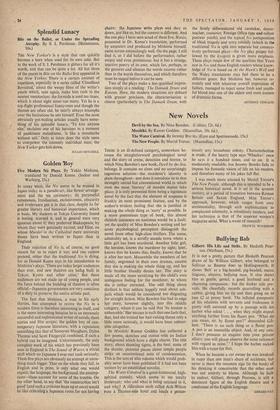New Novels
THERE is an ill-defined category, somewhere be- tween the straightforward psychological novel and the story of crime, detection and horror, to which Nina Bawden's new book, Devil by the Sea, belongs. It contains no clues and no surpiisingly ingenious solution—the murderer's identity is plain throughout—nor does it introduce us to that strangely unreal but conventional world in which even the most 'literary' of murder stories take place; it is only prevented from being a legitimate novel by the fact that the element of suspense is frankly its most prominent feature, and by the author's evident feeling that she is justified in making the whole thing as 'nasty' as possible. In a more pretentious type of book, this almost childish insistence on nastiness would be a fault; yet the quality of Miss Bawden's writing and her acute psychological perception distinguish the novel from other high-class thrillers. The scene, admirably set, is a scruffy seaside town where a little girl has been murdered. Another little girl, the heroine, knows the murderer by sight; later, knows that he knows this; finally, knows that he is after her next. Meanwhile the members of her family, engrossed in their own dramas, assume that she is making the whole thing up, and her little brother blandly denies her. The story is made all the more terrifying by the child's own ambiguous feeling for the murderer, to whom she is rather attracted. The odd thing about thrillers is that addicts happily read about sub- jects which would be considered too disgusting for straight fiction. Miss Bawden has had to edge her story, however slightly, into this middle category, where it can be said that 'its tension is unbearable.' Her success is such that one feels that, that, had she treated her hair-raising theme only a little more seriously, it would have been unbear- able altogether.
In Mooltiki Rumer Godden has collected a few poems, sketches and stories with an Indian background which have a slight charm. The title story, about shooting tigers, is the best; some of the shorter, pictorial pieces about simple people strike an unintentional note of condescension. This is the sort of slim volume which would prob- ably never have been published if it had not been written by an established novelist.
The Water Carnival is a good-humoured, high- spirited comedy, which seems to me totally irrelevant; who and what is being satirised in it, and why? A ridiculous snob called Auk-Wilson runs a Thames-side hotel and heads a preten-
tiously arty houseboat colony. Characterisation is crude; if the hearty type says 'Whack° !' once he says it a hundred times, and so on. It is moderately readable, but Jeremy Brooks fails to impose his fantastic vision of life on his readers, and therefore many of his jokes fall flat.
I was much more amused by Meriol Trevor's The New People, although this is intended to be a serious historical novel. It is set in the seventh century, at a period of transition between Roman Britain and Saxon England. Miss Trevor's approach, however, which ranges from cosy sentimentality, through arch sophistication to complacent solemnity, is relentlessly modern, and her technique is that of the superior women's magazine serial. What a waste of research !
FRANCIS WYNDHAM










































 Previous page
Previous page